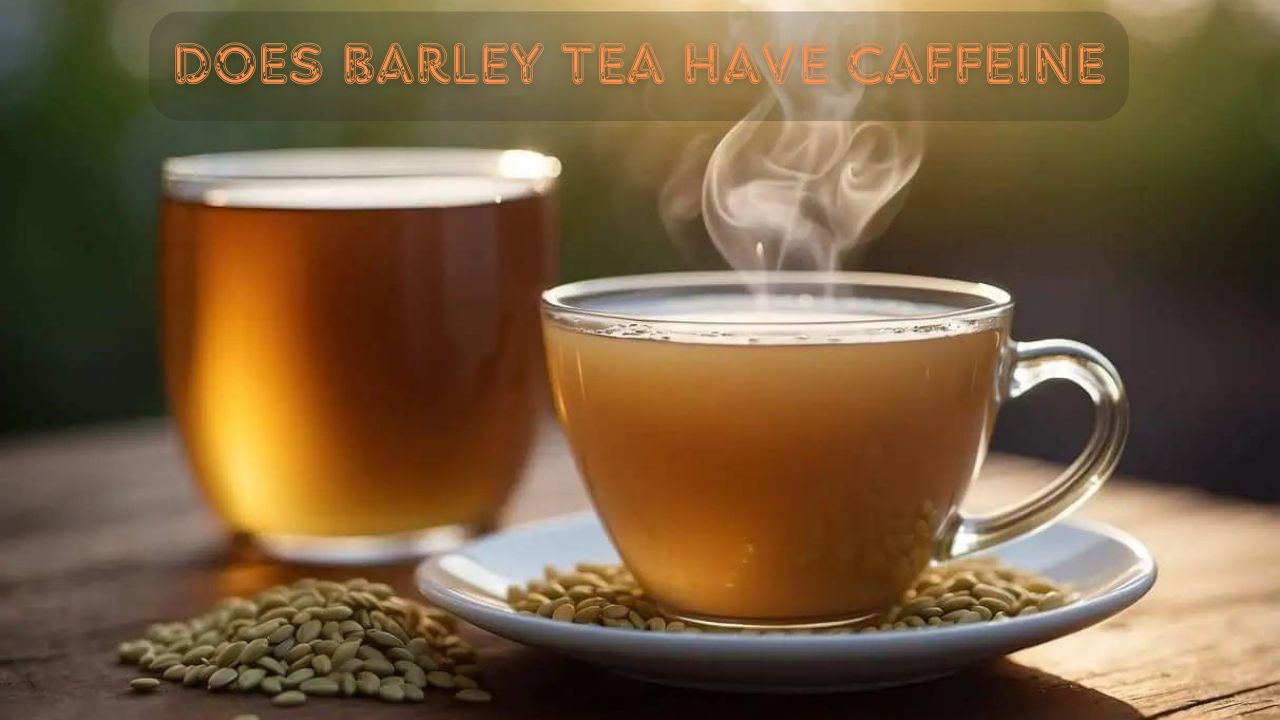Written By: Sherry Harris
Barley tea is a traditional drink that originated in East Asia and has become increasingly popular worldwide. Known for its nutty flavor and potential health benefits, it is often enjoyed as a refreshing beverage, both hot and cold.
One of the key questions about barley tea: Does Barley Tea Have Caffeine?, especially for those looking for caffeine-free alternatives to traditional teas and coffee.
In this article, we’ll explore the composition of barley tea, its health benefits, how it compares to other teas, and any potential side effects.
Table of Contents
What is Barley Tea?
Barley tea, known as mugi cha in Japan, boricha in Korea, and damai cha in China, is a caffeine-free beverage made from roasted barley grains. It is popular in these countries and can be found in various forms, such as loose grains, tea bags, or ready-to-drink bottled versions.
The Brewing Process
Barley tea is made from roasted barley grains steeped in hot water. The grains are typically roasted until they reach a dark brown color, which gives the tea its distinctive nutty, and slightly sweet flavor.
Barley tea can be brewed using loose grains or tea bags. The brewing process involves boiling the grains in water for a few minutes, and then straining them to produce a clear beverage.
Does Barley Tea Have Caffeine?
Does Barley Tea Have Caffeine? Yes, One of the significant advantages of barley tea is that it is naturally caffeine-free. Unlike other teas made from the Camellia sinensis plant, such as black, green, oolong, and white teas, barley tea does not contain any caffeine, making it an ideal choice for individuals sensitive to caffeine or those seeking a beverage to enjoy in the evening.
Health Benefits of Barley Tea
Barley tea is not just popular for its lack of caffeine. It offers several health benefits that make it a valuable addition to a balanced diet:
Rich in Antioxidants
Barley tea is a good source of polyphenols, including naringenin, quercetin, and vanillic acid. These antioxidants help protect cells from damage caused by free radicals, potentially reducing the risk of chronic diseases.
Supports Digestion
Barley tea is known for aiding digestion. It can help soothe the stomach and is sometimes consumed after meals to promote better digestion.
Heart Health
Regular consumption of barley tea may help improve circulation and lower cholesterol levels, contributing to better heart health.
Weight Management
Barley tea is a low-calorie beverage that can be a healthier alternative to sugary drinks. It may also help with weight management by promoting a feeling of fullness.
Potential Side Effects
While barley tea is generally considered safe for most people, there are a few potential side effects to be aware of:
Gluten Sensitivity: Barley contains gluten, so those with celiac disease or gluten intolerance should avoid barley tea.
Interactions with Medication: Barley tea might interact with medications, especially those for diabetes or anticoagulants. It’s advisable to consult with a healthcare provider if you are on medication.
Allergic Reactions: Some individuals may experience allergic reactions to barley tea, especially if they have a sensitivity to grains or pollen. Symptoms may include itching, swelling, or difficulty breathing.
Gastrointestinal Issues: Although barley tea can aid digestion, excessive consumption might lead to gastrointestinal discomfort in some people. This can include bloating or gas, particularly if the tea is consumed in large quantities or by individuals with sensitive stomachs.
Barley Tea Nutritional Information
Barley tea is a low-calorie beverage that is naturally caffeine-free, making it a popular choice for those seeking a healthy drink option. It contains essential nutrients, including fiber, vitamins, and minerals.
Barley tea is particularly rich in antioxidants such as polyphenols and lignans, which help protect against oxidative stress and inflammation. It also contains small amounts of vitamins B and E, as well as minerals like selenium and magnesium, contributing to overall health benefits like improved digestion, better circulation, and enhanced heart health.
Being naturally free of sugar and fat, barley tea can be a refreshing and nutritious alternative to sugary beverages. Here is a table summarizing the nutritional information for barley tea:
| Nutrition Facts | Amount Per Serving (per 8 oz cup) |
|---|---|
| Calories | 0-5 |
| Protein | 0 g |
| Total Fat | 0 g |
| Saturated Fat | 0 g |
| Trans Fat | 0 g |
| Total Carbohydrates | 0 g |
| Dietary Fiber | 0 g |
| Sugars | 0 g |
| Sodium | 0 mg |
| Caffeine | 0 mg |
Barley tea is naturally low in calories and free of fats, sugars, and sodium, making it a healthy beverage choice. It is also caffeine-free, providing a relaxing alternative to caffeinated drinks.
👉 Does La Croix Have Caffeine?
Barley Tea Variants and their Caffeine Content
Japanese Mugi Cha:
This traditional Japanese barley tea is made from roasted barley grains and is completely caffeine-free. It has a nutty flavor and can be enjoyed hot or cold, making it a popular beverage choice in Japan.
Korean Bori Cha:
Bori Cha is Korea’s version of barley tea, also caffeine-free. It is often served as a refreshing drink in Korean households and restaurants. Its preparation involves boiling roasted barley grains in water, resulting in a light and toasty flavor.
Chinese Damai Cha:
Damai Cha is the Chinese variant of barley tea and is also free of caffeine. This tea is known for its smooth, roasted flavor and is commonly consumed for its cooling properties and digestive benefits.
Barley & Green Tea Blend:
Some blends combine barley with green tea, which introduces caffeine to the mix. The caffeine content depends on the ratio of green tea to barley, typically resulting in a lower caffeine level than pure green tea.
Barley Herbal Infusions:
Occasionally, barley is combined with other caffeine-free herbs or flowers, such as chamomile or hibiscus. These infusions are typically caffeine-free, leveraging barley’s nutty taste while incorporating the flavors and benefits of other herbs.
List of Ingredients in Barley Tea
Here is a list of ingredients commonly found in barley tea:
Roasted Barley Grains: The primary ingredient in barley tea is roasted barley grains. These are responsible for the tea’s characteristic nutty and slightly sweet flavor. The grains are typically roasted to a dark brown color to enhance their taste.
Water: Water is the medium in which the roasted barley grains are steeped or boiled to make the tea. The quality of the water can affect the final taste of the tea.
Optional Flavorings: Some variations of barley tea may include additional ingredients like corn, chicory root, or other grains to enhance the flavor profile. These additions do not typically alter the caffeine-free nature of the tea.
Herbs and Spices: In some blends, barley tea may be infused with herbs or spices such as ginger, cinnamon, or mint to provide additional flavors and potential health benefits.
These ingredients can vary slightly depending on the region and the specific recipe used, but roasted barley grains and water are the fundamental components of barley tea.
Alternatives to Barley Tea and their Caffeine Content
If you’re seeking for best alternatives to barley tea that are low in caffeine, many options can suit different tastes and preferences. Here are some popular choices given below with their caffeine content:
Green Tea:
Contains 20–45 mg of caffeine per cup. It is known for its high antioxidant content and potential health benefits, including weight loss and improved brain function.
Black Tea:
Has 40–70 mg of caffeine per cup. It offers a robust flavor and is associated with improved cardiovascular health and lower cholesterol levels.
Oolong Tea:
Contains 30–50 mg of caffeine per cup. Oolong tea aids in metabolism and fat oxidation, making it a popular choice for weight management.
White Tea:
Contains 15–30 mg of caffeine per cup. This tea is delicate and sweet, with high levels of antioxidants that may contribute to cancer prevention.
Rooibos Tea:
Naturally caffeine-free, rooibos tea is rich in antioxidants and has a sweet, slightly nutty flavor. It is popular for its calming effects and potential to reduce allergies.
Hibiscus Tea:
Caffeine-free and made from dried hibiscus flowers, this tea has a tart flavor and is known for its high vitamin C content, which supports immune health.
Peppermint Tea:
Another caffeine-free option, peppermint tea is known for its refreshing taste, benefits for digestion, and relief from headaches.
Chamomile Tea:
Caffeine-free and often consumed for its soothing properties, chamomile tea may help with relaxation and improve sleep quality.
Here is a table that lists alternatives to barley tea and their caffeine content:
| Tea Alternative | Caffeine Content (per 8 oz cup) |
|---|---|
| Green Tea | 20-45 mg |
| Black Tea | 40-70 mg |
| Oolong Tea | 30-50 mg |
| White Tea | 15-30 mg |
| Rooibos Tea | 0 mg (caffeine-free) |
| Hibiscus Tea | 0 mg (caffeine-free) |
| Peppermint Tea | 0 mg (caffeine-free) |
| Chamomile Tea | 0 mg (caffeine-free) |
These alternatives vary in caffeine content and flavor, providing a range of options for those seeking either caffeinated or caffeine-free beverages.
👉 Does Dunkin Refresher Have Caffeine?
Conclusion
Does Barley Tea Have Caffeine? Barley tea is a delightful and healthy beverage that offers several benefits without the caffeine found in traditional teas. Its rich flavor and potential health advantages make it an excellent choice for anyone looking to diversify their tea selection or reduce their caffeine intake.
As with any food or drink, it’s essential to enjoy barley tea in moderation and be mindful of any personal health conditions that might be affected by its consumption.
FAQS
1. Can I drink barley tea if I am pregnant?
Yes, barley tea is generally considered safe to drink during pregnancy because it is caffeine-free. However, it’s always best to consult with a healthcare provider before making any dietary changes during pregnancy.
2. How often should I drink barley tea for health benefits?
There are no strict guidelines on how often to drink barley tea. It can be consumed daily as part of a balanced diet. Listening to your body and enjoying it in moderation should suffice for reaping its benefits.
3. Can barley tea help with digestion?
Yes, barley tea is known to aid digestion and soothe the stomach. It’s often consumed after meals in East Asian cultures to promote better digestive health.
4. Is there any sugar in barley tea?
Barley tea is naturally sugar-free, making it a healthier alternative to sugary beverages. It has a naturally nutty and slightly sweet flavor due to the roasted barley grains.
5. Does barley tea have any side effects?
Barley tea is generally safe for most people. However, it contains gluten, which can cause reactions in individuals with celiac disease or gluten intolerance. Additionally, it may interact with certain medications, so it’s advisable to consult with a healthcare provider if you have any concerns.

